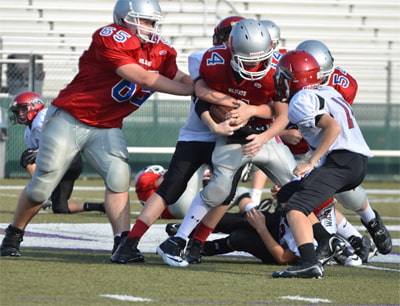Identifying and preventing ACL injuries, concussions

A good percentage of Americans love football for the fast-paced, hard-hitting product displayed on the field. And spectators enjoy the game at all levels — grade school, high school, college and the pros. Because the nature of football is highly intense and physical, injuries are prevalent. In particular, ACL injuries and concussions commonly surface in athletes of all age levels. And these injuries aren't limited to just football — many other sports pose risks.
But what are ACL injuries and concussions? What symptoms should you be aware of? How can you prevent them? Let’s examine both injuries in more detail to find those answers.
ACL injuries
The ACL is one of the primary ligaments that connects your femur, or thighbone, to your tibia, or shinbone, helping stabilize your knee joint. With an ACL injury, the ligament tissue is often partially or fully torn. In less severe instances, the ACL can be sprained but left intact.
Symptoms of an ACL injury include:
- A popping noise in the knee at the time of the injury
- Extreme knee pain that inhibits continuing the activity
- Swelling around the knee that starts within a few hours of an injury
- Decrease in knee mobility
- Feeling unstable when bearing weight on the knee
If you notice symptoms of ACL damage, seek medical care immediately. A timely diagnosis is essential to ensure your knee is treated effectively. One potential complication related to ACL injuries is knee instability, which, when left untreated, can lead to premature degenerative changes in the joint (arthritis).
To prevent ACL problems, athletes should train properly by:
- Working out the hamstrings to balance leg muscle strength
- Strengthening the core muscles
- Using proper jumping and landing techniques (Knees over toes is the correct position!)
- Improving pivoting and cutting techniques by working on balance and coordination drills
Concussion
While ACL injuries are serious, concussions are an even bigger concern with football and other contact sports. A concussion is a mild traumatic brain injury that alters the functional capacity of the brain, leading to temporary concentration, memory, balance and coordination problems. Kids have been shown to be more likely to sustain a concussion from contact than adults. Long-term effects of concussions can be severe and life-altering.
Symptoms of concussion may include:
- Headache or head pressure
- Temporary loss of consciousness
- Confusion or mental fog
- Dizziness
- Ringing in the ears
- Nausea
- Vomiting
- Slurred speech
- Delayed response to questions
Sometimes concussion symptoms appear hours or days later. These signs can present as:
- Concentration and memory complaints
- Changes in personality, such as irritability
- Sleep problems
- Depression
- Sensitivity to light and noise
To ensure proper management of a concussion, see a physician within one to two days of any head injury, even if it’s not an emergency. In addition, never return to sports or physical activity with concussion symptoms, always have a professional evaluate a head injury and be sure to wear necessary protective equipment during sports.
If you’re concerned about sports injuries, such as with the knees and head, speak to your healthcare team or consider an activity with little to no physical contact.
Josh Berndt is a physical therapist in Waseca, Minnesota.



